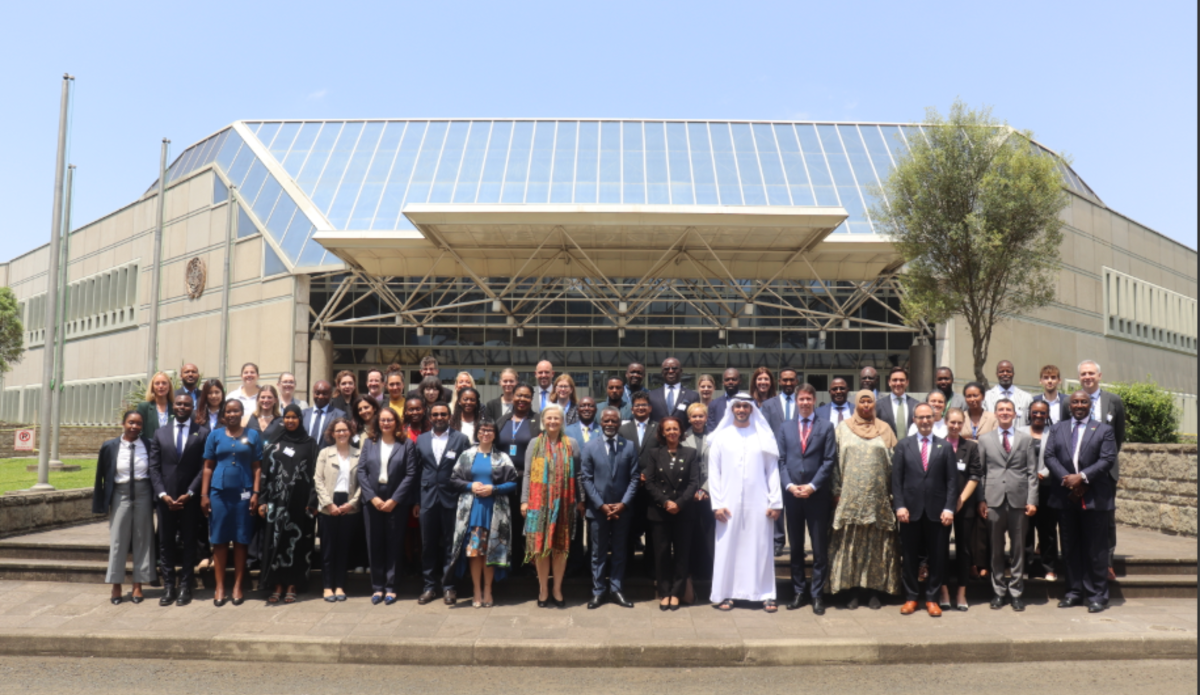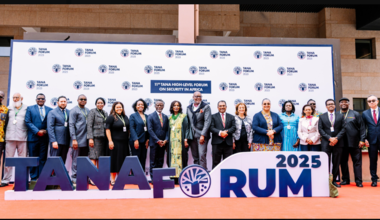Regional Partnerships to Bridge Climate Action, Peace and Security
Addis Ababa, Ethiopia - 23 June 2025 - The Climate Security Mechanism (CSM) at the United Nations, jointly with the United Nations Office to the African Union (UNOAU), concluded the 2025 CSM Partnership Dialogue today in Addis Ababa and online. The event was held in partnership with the Group of Friends on Climate and Security.
The Dialogue brought together Member States, regional organisations, UN entities, civil society, financial institutions and research partners to highlight shared priorities and reinforce collaboration at the intersection of climate, peace and security (CPS). Discussions focused on how partnerships between regional and subregional bodies, national governments, and the UN system can deliver more integrated, forward-looking solutions and results on the ground.
The CSM Partnership Dialogue was established as a platform to share progress on CSM-supported initiatives and invite reflections from a variety of countries and regions, including those facing climate, peace and security challenges and opportunities. The 2025 edition of the Dialogue was convened at a time of increasing institutional momentum and operational engagement across the African continent, including efforts by the African Union to articulate a Common African Position on Climate Change, Peace and Security, and by the increasing mobilisation of regional organisations and Member States to address climate-related peace and security risks. These processes mark a milestone for the CPS agenda in Africa, anchoring it within national and regional frameworks in the lead-up to the second Africa Climate Summit and UNFCCC COP30.
Participants received insights from Climate, Peace and Security Advisors deployed across UN missions or seconded to regional organisations, who shared practical experiences in responding to climate-related peace and security risks and opportunities. These contributions highlighted the importance of context-specific analysis, sustained regional engagement, and cross-pillar cooperation. The Dialogue also offered space for countries most exposed to the dual challenges of climate change and peace and security to share their priorities, and for partners to reflect on where support is most needed.
This Dialogue also marked the launch of the Survey of Practice on Climate, Peace and Security, a new report that summarises emerging lessons learned, and knowledge gained from Climate, Peace and Security Advisors and other initiatives supported by the Climate Security Mechanism at regional and country level around the world.
A core aim of the Dialogue was to identify where cooperation can be deepened to better respond to climate-related peace and security risks and opportunities, and how the CSM can continue to support nationally and regionally led initiatives through analysis, technical engagement and capacity support. Several announcements were made that reflect this spirit of partnership:
-
The Economic Community of Central African States (ECCAS) reaffirmed its commitment to deepening collaboration with the United Nations Regional Office for Central Africa (UNOCA) and the Climate Security Mechanism. This commitment relies, in particular, on the technical support provided by the Climate, Peace and Security Advisor. In this context, ECCAS is working to strengthen early warning systems, develop a conflict-sensitive regional strategy on Climate and Development, and promote interregional exchange of experience and good practices. ECCAS also highlighted its active participation in the recent briefing to the Informal Expert Group of members of the Security Council on climate, peace and security, its role in the regional capacity-building workshop co-organized with UNOCA, as well as its continued collaboration with UNOWAS and ECOWAS to address complex farmer-herder dynamics in Central and West Africa.
-
The Intergovernmental Authority on Development (IGAD) pledged to sustain its collaboration with the UN Office of the Special Envoy for the Horn of Africa and UN CPS Hub in operationalising IGAD’s Regional Climate Security Coordination Mechanism. IGAD further iterated upcoming priorities to develop a common regional policy on Climate, Peace and Security, building on analytical work undertaken under the Mechanism, and to replicate the Kenyan Chiefs Climate Action Initiative as a best practice in the region. In the spirit of subsidiarity and complementarity, IGAD will continue working closely with the African Union on the Common African Position on Climate, Peace and Security and beyond.
- The Lake Chad Basin Commission (LCBC) reaffirmed its unwavering commitment to working in close collaboration with the Climate Security Mechanism to support its Member States in the effective mainstreaming of Climate, Peace, and Security approaches. LCBC further called on the CSM to champion and facilitate the implementation of actionable and transformative solutions across the Lake Chad Basin region.
- The Liptako-Gourma Authority (LGA) further committed to advancing the operationalisation of the regional Climate, Peace and Security Strategy drawn from the national climate strategies and efforts from its Member States in line with the Bamako Declaration, incorporating gender-responsive training and capacity-building for youth, women, and internally displaced persons (IDPs) in cross-border areas. In partnership with UNDP, the LGA has started data collection on CPS, together with other dynamics in the region such as conflicts, socioeconomic trends to feed its KMP. Furthermore, the LGA emphasised the indispensable role of the Climate Security Mechanism and the support of a posted Climate, Peace and Security Advisor to facilitate interaction with national entities and other regional partners to advance the CSM and ensure the implementation of national CPS action plans and the regional CSP strategy as we move towards COP30.
- Chad, as Chair of the Improved and Equitable Access Network on climate finance for countries affected by climate change, conflicts, and high levels of humanitarian needs, and speaking on behalf of its members, emphasised the importance of ensuring that countries facing the compounded impacts of climate change, conflict and humanitarian need are not left behind. The Network, which brings together Burundi, Iraq, Sierra Leone, Somalia, Timor-Leste and Yemen, provides a platform to share experiences, strengthen access to climate finance and advocate for solutions tailored to the realities of fragile and conflict-affected settings. Chad expressed the Network’s interest in deepening collaboration with UNOCA and the Climate Security Mechanism to support the efforts of its members.
- Gabon announced its commitment to play a leading role in promoting and advancing the climate, peace and security agenda during the upcoming sessions of the United Nations Standing Advisory Committee on Security Questions in Central Africa (UNSAC). To support informed dialogue and interregional collaboration, the Climate Security Mechanism and UNOCA will be invited to contribute technical presentations on the Climate, Peace and Security nexus in the subregion.
-
New partners and pledges of financial and in-kind support to advance the work of the Climate Security Mechanism: Several Member States announced new or continued support for climate, peace and security efforts. Portugal announced its support to the CSM as a new donor partner and committed to collaborate closely with the CSM. The Republic of Korea announced its sponsorship of two Junior Professional Officer positions focused on climate, peace and security from 2026 - one with the Department of Political and Peacebuilding Affairs in New York and one with the United Nations Office to the African Union in Addis Ababa. Switzerland reiterated its support for climate, peace and security efforts with the UNOAU, including through a Climate, Peace and Security Advisor, and committed to making additional funding available to support the UNOAU’s CPS cooperation with the AU and the broader CSM/CPS community across the African continent.
-
The United Nations Economic Commission for Africa (UNECA) emphasised the importance of prioritising Climate, Peace and Security as an integral dimension of continental climate policy. For the first time, the 6th Africa Climate Talks incorporated CPS into Africa’s roadmap to COP30, in collaboration with UNOAU. Building on this momentum, UNECA reaffirmed its commitment to advancing Climate, Peace and Security through key platforms such as the Annual Climate Change and Development in Africa Conference (CCDA) and broader continental engagements.
Quotes from Speakers:
Mr. Stefan Pretterhofer, Deputy Permanent Representative of Austria to the United Nations, speaking on behalf of the Climate Security Mechanism Joint Steering Committee Co-Chairs, Austria and the United Arab Emirates, stated: “The real work happens beyond New York through concrete action on the ground. This is precisely where the Climate Security Mechanism proves its value. It helps translate global concern into tangible support through tools such as the deployment of Climate, Peace and Security Advisors. The Partnership Dialogue is a vital opportunity to better understand the perspectives, recommendations, best practices and lessons learned of those most impacted by climate change, as well as explore opportunities for further partnerships to move the dial on this global issue”.
H.E. Ms. Lara Daniel, Permanent Representative of Nauru to the United Nations, in her capacity as co-chair of the Group of Friends on Climate and Security, stated: “The Group of Friends on Climate and Security remains committed to elevating this agenda, championing multilateral action, and ensuring that those most affected by the climate-security nexus are also at the centre of the response. The CSM has become a cornerstone of interagency collaboration, breaking silos across the UN system, embedding climate-security expertise in missions, and supporting national and regional partners through analysis, training, and coordination”.
Media contact: csm-core@un.org
About the Climate Security Mechanism
The Climate Security Mechanism (CSM) is a joint initiative by the United Nations Department of Political and Peacebuilding Affairs (DPPA), the United Nations Development Programme (UNDP), the United Nations Environment Programme (UNEP), and the United Nations Department of Peace Operations (DPO). Responding to growing calls for action by affected communities, Member States, regional organizations, experts and policymakers around the world, the CSM seeks to strengthen the capacity of the United Nations and its partners to systematically analyse and address the linkages between climate change, peace and security. Established in late 2018, the CSM draws on the complementary resources of DPPA, UNDP, UNEP, and DPO. The CSM works with partners to advance peace-positive climate action, catalyse climate-informed approaches to peace and security, and forge partnerships at all levels to exchange information and build the evidence base. To that end, the CSM provides technical advice and tailored support to UN field missions, country teams, regional organizations and other partners to bolster the analysis, reduction and management of climate-related peace and security risks. Beyond its local work, the CSM seeks to build an enabling environment and catalyse action by partners at all levels by investing in knowledge management and capacity building and by leveraging the convening power of its member entities.
About the CSM Partnership Dialogue
The CSM Partnership Dialogue provides an opportunity for existing and prospective partners to deepen their understanding of the CSM’s work and to hear from Climate, Peace and Security Advisors working across different regions and countries. It is also an opportunity for partners and Member States, including those most exposed to the challenges brought by climate, peace and security (CPS), to share priorities, opportunities and advancements in their own work, contributing to shared learning and improved impact. Furthermore, it allows participants to hear a range of different perspectives from Member States, regional organizations, UN and international financial institutions, research and knowledge partners, and practitioners.
Source: https://www.un.org/climatesecuritymechanism/en/news/climate-security-mec...
 UN
UN







